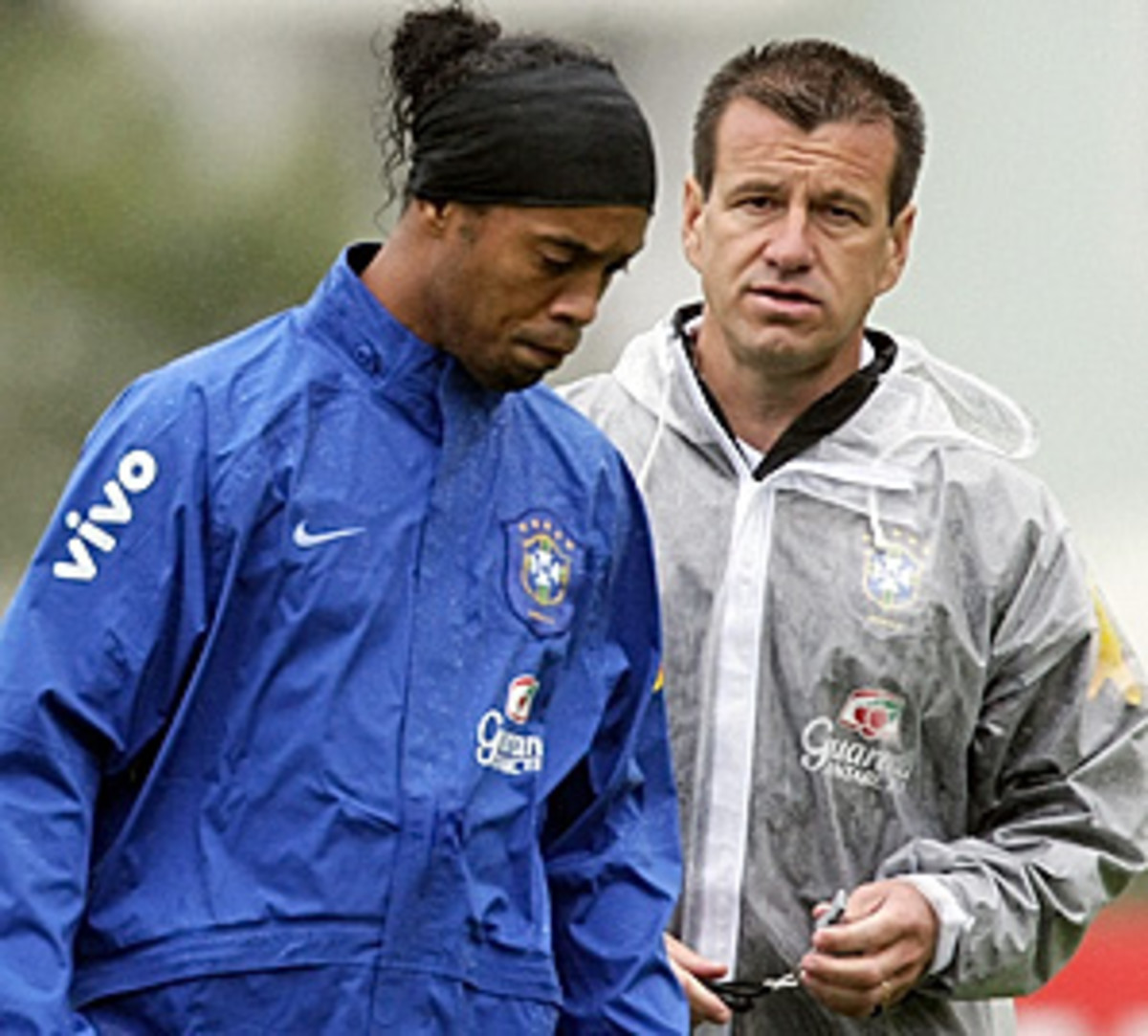Brazil's Dunga unfazed by critics
As March moved into April, momentum built for adding the young Santos pair, Neymar and Paulo Henrique Ganso, to the national team. Predictably, coach Dunga was unmoved -- though 20-year-old attacking midfielder Ganso has been placed on standby. The biggest push was for 18-year-old support striker Neymar. After the preliminary roster was named on May 11, one journalist told Dunga that he would go down in history alongside Argentina coach Cesar Luis Menotti, who had omitted the 17-year-old Diego Maradona from the squad for the 1978 World Cup.
It was an intellectual low point of the pro-Neymar campaign, a gaffe quickly seized upon by Dunga. Hindsight would seem to indicate that Menotti made the right call. Argentina, of course, won that year's competition, and even four years later in the next World Cup Maradona struggled with the demands made upon him.
The call for the inclusion of home-based players is normal and natural in Brazilian soccer. It reflects the wounded pride of a soccer culture that has to cope with the constant sale of its outstanding talents. But don't expect it to be rational -- some of those who today attack the inclusion of Wolfsburg midfielder Josue, for example, were arguing just as ferociously in his favor when he played for Sao Paulo.
I recall the reaction of then-national team coach Emerson Leao when Brazil lost to Ecuador in a 2001 World Cup qualifier. He would institute a revolution in the team, he said. Out would go the European-based players. In would come the home-based brigade. I whispered to myself that he had just talked himself out of a job. His new approach met with universal approval from the press and public ... right up until the moment when the team took the field.
Brazil played an appalling game at home to a poor Peru side. The Brazilians drew 1-1, could even have lost, and by the time the next qualifying match was played, a certain Luiz Felipe Scolari was picking the team. The belief in the home-based players could not survive contact with reality. Their mediocrity was exposed in competition.
Neymar and Ganso are certainly not mediocre. They are outstanding prospects. But are they ready for a World Cup? Different question.
Dunga made a point I raised last month in an article about the pair. Just a few months ago, Ganso was a relative disappointment in the U-20 World Cup, while Neymar was an absolute disappointment in the World U-17s. Performances in the Sao Paulo State Championship are hardly a barometer for a World Cup, especially with the current criteria of Brazilian referees, who call fouls on the slightest physical contact.
Some argued that Neymar should be taken to the World Cup to gain experience. Dunga was having none of it. He is being paid to win this year's World Cup, he said, not that of 2014.
He may also dive into his own playing days to recall the 1994 World Cup, when a highly promising 17-year-old striker named Ronaldo was taken along for the ride. Brazil, of course, won the competition, but on the way it had to cope with the consequences of including the goofy youngster. The Brazilian media pushed and pushed again to get Ronaldo on the field -- they even went to the mother of then-coach Carlos Alberto Parreira and enlisted her support in the pro-Ronaldo campaign. All of this created a problem for Parreira to administer.
Dunga is acutely aware that since then it has become easier for the outside world to penetrate a squad and threaten its sense of unity. Back in 1994, the players did not even have mobile phones, let alone Internet connections. With Neymar on board, the Brazilian media would lobby for him to play as soon as the side failed to live up to expectations. At risk then would be the concept closest to Dunga's heart -- the harmony of the group.
Every decision that Dunga makes comes with this in mind. Individuals might win you matches, he argues, but groups win you titles.
This explains the absence of Ronaldinho -- the group "jelled" better after he was axed last year. It explains the exclusion of Adriano -- Dunga made it clear that if he condoned the behavior of the big striker, who has frequently missed training sessions this year, then he would lose command of the group. And it explains the exclusion of Neymar and Ganso -- bringing them in would mean dropping a couple of his old favorites, members of a group that has achieved a sequence of excellent results.
In 23 games over the last two seasons, Brazil has won 18 and lost one. After Brazil's preliminary squad for South Africa was released, one journalist accused Dunga of being conservative, of lacking audacity. His answer -- fully justified by the facts -- was that if he has been conservative, he has also been successful.
For what it's worth, I have criticized him before and will almost certainly criticize him again. But in 2006, Brazil had all the star names anyone could wish -- and that didn't work. Based on his track record, Dunga has earned the right to try to win the World Cup his way.





